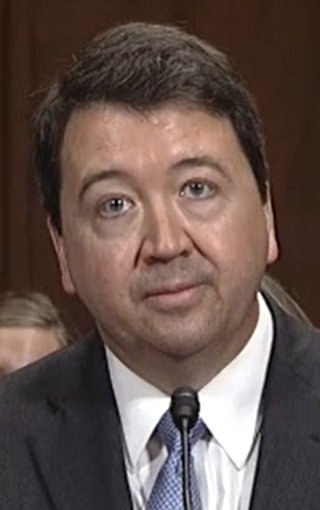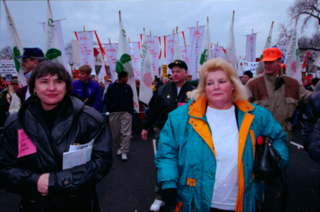Roe v. Wade, 410 U.S. 113 (1973), was a landmark decision of the U.S. Supreme Court in which the Court ruled that the Constitution of the United States generally protected a right to have an abortion. The decision struck down many abortion laws, and caused an ongoing abortion debate in the United States about whether, or to what extent, abortion should be legal, who should decide the legality of abortion, and what the role of moral and religious views in the political sphere should be. The decision also shaped debate concerning which methods the Supreme Court should use in constitutional adjudication.
Lawrence v. Texas, 539 U.S. 558 (2003), is a landmark decision of the U.S. Supreme Court in which the Court ruled that most sanctions of criminal punishment for consensual, adult non-procreative sexual activity are unconstitutional. The Court reaffirmed the concept of a "right to privacy" that earlier cases had found the U.S. Constitution provides, even though it is not explicitly enumerated. It based its ruling on the notions of personal autonomy to define one's own relationships and of American traditions of non-interference with private sexual decisions between consenting adults.

The United States is a global outlier among developed countries on the issue of abortion, with the subject being divisible in American politics and culture wars to an extent not found elsewhere. There are widely different abortion laws depending on state.

Harry Andrew Blackmun was an American lawyer and jurist who served as an Associate Justice of the Supreme Court of the United States from 1970 to 1994. Appointed by Republican President Richard Nixon, Blackmun ultimately became one of the most liberal justices on the Court. He is best known as the author of the Court's opinion in Roe v. Wade.
Webster v. Reproductive Health Services, 492 U.S. 490 (1989), was a United States Supreme Court decision on upholding a Missouri law that imposed restrictions on the use of state funds, facilities, and employees in performing, assisting with, or counseling an abortion. The Supreme Court in Webster allowed for states to legislate in an aspect that had previously been thought to be forbidden under Roe v. Wade (1973).

Sarah Catherine Ragle Weddington was an American attorney, law professor, advocate for women's rights and reproductive health, and member of the Texas House of Representatives. She was best known for representing "Jane Roe" in the landmark Roe v. Wade case before the United States Supreme Court. She also was the first woman General Counsel for the US Department of Agriculture.
Doe v. Bolton, 410 U.S. 179 (1973), was a decision of the Supreme Court of the United States overturning the abortion law of Georgia. The Supreme Court's decision was released on January 22, 1973, the same day as the decision in the better-known case of Roe v. Wade.
The paternal rights and abortion issue is an extension of both the abortion debate and the fathers' rights movement. Abortion can be a factor for disagreement and lawsuit between partners.
Ayotte v. Planned Parenthood of Northern New England, 546 U.S. 320 (2006), was a decision by the Supreme Court of the United States involving a facial challenge to New Hampshire's parental notification abortion law. The First Circuit had ruled that the law was unconstitutional and an injunction against its enforcement was proper. The Supreme Court vacated this judgment and remanded the case, but avoided a substantive ruling on the challenged law or a reconsideration of prior Supreme Court abortion precedent. Instead, the Court only addressed the issue of remedy, holding that invalidating a statute in its entirety "is not always necessary or justified, for lower courts may be able to render narrower declaratory and injunctive relief."

The Thomas More Law Center is a Christian, conservative, nonprofit, public interest law firm based in Ann Arbor, Michigan, and active throughout the United States. According to the Thomas More Law Center website, its goals are to "preserve America's Judeo-Christian heritage, defend the religious freedom of Christians, restore time-honored moral and family values, protect the sanctity of human life, and promote a strong national defense and a free and sovereign United States of America."
Richard Fred Suhrheinrich is a Senior United States circuit judge of the United States Court of Appeals for the Sixth Circuit serving in Lansing, Michigan He had been a United States district judge of the United States District Court for the Eastern District of Michigan.
Gonzales v. Carhart, 550 U.S. 124 (2007), was a landmark decision of the U.S. Supreme Court that upheld the Partial-Birth Abortion Ban Act of 2003. The case reached the high court after U.S. Attorney General, Alberto Gonzales, appealed a ruling of the U.S. Court of Appeals for the Eighth Circuit in favor of LeRoy Carhart that struck down the Act. Also before the Supreme Court was the consolidated appeal of Gonzales v. Planned Parenthood from the U.S. Court of Appeals for the Ninth Circuit, whose ruling had the same effect as that of the Eighth Circuit.
James L. Dennis is an American lawyer, jurist, and former politician serving as a senior United States circuit judge of the United States Court of Appeals for the Fifth Circuit, with chambers in New Orleans, Louisiana.

The legality of abortion in the United States and the various restrictions imposed on the procedure vary significantly depending on the laws of each state or other jurisdiction. Some states prohibit abortion at all stages of pregnancy with few exceptions, others permit it up to a certain point in a woman's pregnancy, while others allow abortion throughout a woman's pregnancy. In states where abortion is legal, several classes of restrictions on the procedure may exist, such as parental consent or notification laws, requirements that patients be shown an ultrasound before obtaining an abortion, mandatory waiting periods, and counselling requirements.

John Kenneth Bush is an American attorney and United States circuit judge of the United States Court of Appeals for the Sixth Circuit. Bush graduated from Harvard Law School and practiced in Washington, D.C., and Louisville, Kentucky, where he served as president of the local branch of the Federalist Society. In 2017, he was nominated to a seat on the Sixth Circuit by President Donald Trump.
Abortion in Louisiana is mostly illegal as of August 1, 2022.
Elective abortions in Wisconsin became illegal after the overturning of Roe v. Wade by the Supreme Court of the United States on June 24, 2022. An 1849 law bans the procedure in all cases except when the life of the mother is in danger. The enforceability of the law is disputed and being considered by the state courts.

Sandra Cano, better known by the legal pseudonym "Mary Doe," was the plaintiff in the lawsuit case Doe v. Bolton (1970), the companion case to Roe v. Wade (1973) which legalized abortion in the United States. Cano held anti-abortion views and claimed she had been manipulated by her lawyer, Margie Pitts Hames. She repeatedly attempted to have the decision overturned. She also undertook anti-abortion activism, with Norma Jane McCorvey among others, and filed a Friend of the Court brief seeking to limit partial birth abortions.
Mazurek v. Armstrong, 520 U.S. 968 (1997), was a United States Supreme Court case in which the Court upheld a Montana law permitting only licensed physicians to perform abortions. The Court summarily reversed a ruling of the United States Court of Appeals for the Ninth Circuit that had held that the law was likely intended to inhibit abortion access. In a per curiam opinion, a majority of the Court found that there was no evidence that the Montana legislature acted with an invalid intent. The Court also reiterated its earlier holding in Planned Parenthood v. Casey that the states have broad flexibility to regulate abortion so long as their regulations do not create an undue burden on a woman's right to choose. Three dissenting justices, in an opinion by Justice John Paul Stevens, wrote that they would have declined to hear the case because proceedings were still pending in the lower courts. The law itself was later struck down by the Montana Supreme Court on state-constitutional grounds, but the U.S. Supreme Court's decision has nonetheless had a significant impact on modern American abortion jurisprudence.
Dobbs v. Jackson Women's Health Organization, No. 19-1392, 597 U.S. ___ (2022), is a landmark decision of the U.S. Supreme Court in which the court held that the Constitution of the United States does not confer a right to abortion. The court's decision overruled both Roe v. Wade (1973) and Planned Parenthood v. Casey (1992), returning to individual states the power to regulate any aspect of abortion not protected by federal law.





